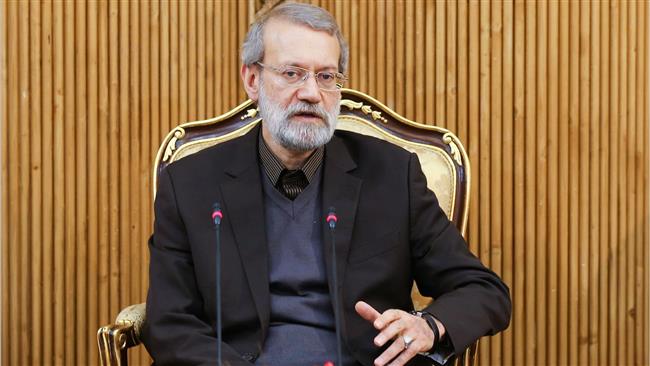
RNA - The top lawmaker made the remarks at Sunday Parliament session held on the National Day of Fight against Global Arrogance, which marks the anniversary of the 1979 takeover of the US embassy in Tehran, known as the den of espionage, by Iranian students.
His remarks were in reaction to Trump’s hostile policies towards Iran, following the US withdrawal from the 2015 Iran nuclear deal, and the re-imposition of economic sanctions, the second batch of which will come into effect on November 5.
Larijani stressed that Donald Trump seeks direct confrontation with the Iranian nation.
“The US should rest assured that the Iranian nation will show how Mr. Trump is far too small to be able to bring the nation to its knees,” said Larijani. “Just how the Iranian nation chased (former Iraqi dictator) Saddam Hussein to his downfall, and the way they chased ISIL’s American mercenary terrorists to their annihilation, they will also make the criminal residents of the White House to regret (their deeds).”
"Today, nations have grown frustrated by US’ hegemony and acts of extortion," said Larijani, adding “the current US’ undeserving and unreasonable administration has become the laughing stock of the world’s politicians, and even their old allies are looking for alternative solutions".
Larijani further stressed that Iran would not forget the behavior of some regional states which have provoked US’ adventurism and paved the way for Israel’s further shenanigans.
On Saturday, Iranian Foreign Ministry Spokesman Bahram Qassemi blasted the US for trying to re-impose fresh sanctions on Tehran, and said Washington's psychological warfare against the Islamic Republic will in no way become a source of concern.
While the Trump administration has been bragging about the efficacy of his anti-Iranian policies, the field facts do not match with the claims. A host of arguments and reasons have been offered by experts to annul Trump's brags and to reinforce the reasoning that the sanctions will not hit the targets.
The first argument that the US embargos will not meet the objectives is focused on the point that Iran's oil and gas are inevitably needed by the world growing economies and developing countries. Even the Americans were forced to issue exemptions to eight countries which have been in dire need to Iran's oil and gas in the past decades like Japan, China, South Korea, Turkey, and India.
The world has come to the conclusion that clearly it is impractical to cut Iran’s oil exports to zero, a Princeton University professor wrote for a western news outlet adding that there is no viable replacement for Iran’s 2.5 million barrels per day in oil exports.
The very first outcome of the US policies against Iran has been the growing trend of the oil price which is expected to pass the terrifying figure of $100 per barrel and even the current price of the OPEC reference basket around $76 is blamed on Trump's withdrawal of the US from the landmark nuclear agreement of July 14, 2015.
Trump's harsh approach towards many countries, both friends and foes, has also made it inconceivable that the other members of the international community will accompany his extremist policies.
Iranian officials have in many cases reassured that the vow to cut Iran's oil revenues to zero is a wild dream never to come true. Both the Iranian government and parliament have taken preparatory measures to minimize the negative effects to the lowest degree.
On last Sunday, Iran's new Economy Minister Farhad Dejpasand downplayed the US November-4 sanctions against Tehran, stressing that his country has planned proper and effective measures to confront them.
In a related front on the same day, Iranian First Vice-President Eshaq Jahangiri assured the nation that the US November-4 sanctions would not leave any tangible impacts on the country, playing down Washington's attempts to stop Iran's oil exports.
"The government declares honorably that the US will not be able to stop Iran's oil sale," Jahangiri said, addressing a forum in Tehran on Sunday.
"The Iranian nation should know that nothing will happen with the second stage of the (US) sanctions; they (the Americans) did whatever they could in the past few months and we have adopted the necessary measures (to confront them)," he added.
According to Fars News Agency, Jahangiri addressed the US officials, saying that the only way before them is interaction and talks without any bullying.
Also, last Tuesday, Iran's Oil Minister Bijan Namdar Zanganeh had played down US President Donald Trump's attempts to zero down Iran's crude exports, warning that his threats would only inflame the market.
"Sustainable and stable supply of the crude needed by customers is a feature of Iran and no country has the capacity to replace Iran's crude in the high-demanding global oil market," Zanganeh said.
He stressed that Iran's crude exports may not be stopped, adding, "Inflammation of the global oil market will continue until oil sanctions against Iran will be removed."
On Monday, Iranian Foreign Minister Mohammad Javad Zarif touched upon the issue before participating in a trilateral meeting with his Turkish and Azeri counterparts in Istanbul.
He downplayed the impacts of the US November-4 sanctions against his country, stressing that Washington's economic and political agenda against Tehran is doomed to failure.
"Nothing new is likely to happen on November 4 when the second phase of the (US) sanctions comes into effect," Zarif told reporters.
847/940